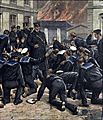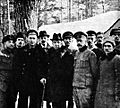Kronstadt rebellion facts for kids
Quick facts for kids Kronstadt rebellion |
|||||||
|---|---|---|---|---|---|---|---|
| Part of the left-wing uprisings against the Bolsheviks and the Russian Civil War | |||||||
|
|||||||
| Belligerents | |||||||
|
|||||||
| Commanders and leaders | |||||||
| Strength | |||||||
| c. first 11,000, second assault: 17,961 | c. first assault: 10,073, second assault: 25,000 to 30,000 | ||||||
| Casualties and losses | |||||||
| c. 1,000 killed in battle and 1,200 to 2,168 executed | Second assault: 527–1,412; a much higher number if the first assault is included | ||||||
The Kronstadt rebellion was a big uprising that happened in March 1921. It was a protest against the Bolsheviks, who were the ruling Communist Party in Russia at the time. This event took place during the last years of the Russian Civil War.
The rebellion was led by a sailor named Stepan Petrichenko. It involved Russian sailors, soldiers, and regular citizens. This revolt was so important that it made Vladimir Lenin, the leader of the Communist Party, decide to change how Russia's economy worked. He introduced a new plan called the New Economic Policy (NEP).
The rebellion started in Kronstadt, which was a strong naval base on Kotlin Island. This island is in the Gulf of Finland and helped protect Petrograd, a major city about 55 kilometers (34 miles) away. The Red Army, which was the Bolsheviks' army, stopped the rebellion after 12 days of fighting. Thousands of people died during this conflict.
According to Lenin, the Kronstadt rebellion was the most serious challenge his government had faced up to that point.
Contents
What Caused the Kronstadt Rebellion?
The main reason for the rebellion was that people were very unhappy with the Bolsheviks' economic policies. These policies were known as "War communism".
Life Under War Communism
- During the Russian Civil War, the Bolsheviks took control of the economy to help win the war.
- The government took food from farmers to feed the army and city workers.
- Factories and businesses were controlled by the state.
- People were not allowed to trade goods freely.
- This made life very hard for many Russians. There was not enough food, and people were starving.
Sailors' Demands for Change
The sailors at Kronstadt had been strong supporters of the Bolsheviks in the past. However, they saw how difficult life had become for ordinary people. They wanted more freedom and a fairer system.
- They demanded new elections for local councils, called "soviets."
- They wanted freedom of speech and freedom of the press.
- They also wanted more economic freedom for farmers and workers.
- These demands were written down in a document called the "Petropavlovsk Resolution."
How the Rebellion Unfolded
The rebellion began on March 7, 1921. The sailors took control of the Kronstadt fortress. They hoped that their actions would inspire other people in Russia to rise up against the Bolshevik government.
Bolshevik Response and Attack
The Bolshevik leaders, including Vladimir Lenin and Joseph Stalin, saw the rebellion as a huge threat. They could not allow it to succeed because Kronstadt was so close to Petrograd.
- The Red Army quickly prepared to attack the fortress.
- The weather was very cold, and the Gulf of Finland was frozen. This allowed the soldiers to march across the ice to reach Kronstadt.
- The first attack by the Red Army was not successful. Many soldiers were killed or injured.
The Final Assault
After the first attack failed, the Red Army gathered more soldiers. They launched a second, much larger attack on March 17, 1921.
- This time, the Red Army had many more soldiers, possibly up to 30,000.
- The fighting was very fierce.
- The Red Army eventually managed to take control of the fortress.
- The rebellion was crushed after 12 days of fighting.
What Happened After the Rebellion?
The Kronstadt rebellion had a major impact on the Bolshevik government.
Impact on Government Policy
- Even though the rebellion failed, it showed Lenin that the people were very unhappy with "War Communism."
- Soon after the rebellion, Lenin introduced the New Economic Policy (NEP).
- The NEP allowed some private trade and farming. This helped to improve the economy and make life better for many Russians.
Consequences for the Rebels
- Many of the rebels were killed during the fighting.
- Others were captured and later executed.
- Some rebels managed to escape to Finland.
- The Kronstadt rebellion remains an important event in Russian history, showing the challenges faced by the early Soviet government.
Images for kids
See also
 In Spanish: Rebelión de Kronstadt para niños
In Spanish: Rebelión de Kronstadt para niños
 | Janet Taylor Pickett |
 | Synthia Saint James |
 | Howardena Pindell |
 | Faith Ringgold |







